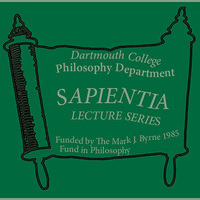Menu
- About
- Humanities Networks
- Faculty
- Students
- Postdocs
- News & Events
Back to Top Nav
Back to Top Nav
Back to Top Nav
Mario De Caro (Università Rome Tre, and Tufts). Naturalism and Nature. Free & open to all. Reception follows.

Abstract: "Philosophical labels are, in general, time-independent designators. According to standards of their own times, Spinoza was a monist. Leibniz a realist. Fichte an idealist, and Marx an atheist. These are labels that are still correctly appliable to those thinkers. This is becase the meanings of the terms "monism", "realism", "idealism", and "atheism" have not changed their meanings over time (or, if they have, only in minor respects). With the term "naturalism," however, the situation is different. In a very general sense, this term means that nothing should be accepted in one's philosophy that is beyond nature. The meaning of this definition, however, is not time-independent. Heraclitus, Jean Buridan, Francis Bacon, Giordano Bruno and Goethe can all be considered (and have been considered) naturalist philosophers when one considers their respective cultural contexts, but nobody who defended one or the other of their views today would be cosidered part of the naturalistic crew. This is because the meaning of the term "naturalism" is conceptually dependent on the meaning of the terms "natural" and "nature" (from which the former derives), and the meanings of these terms have dramatically changed over time. Consequently, in the course of history different forms of naturalism have been developed depending on each period's views of nature. Thus, in discussing the nature of contemporary naturalism, one has to consider which is the conception of nature that philosophers who call themselves naturalists are referring to. The answer to this question, however, is not univocal. Most contemporary naturalists - the "strict" or "scientific" naturalists - take the term "nature" as referring only to the subject matter of the natural sciences, if not to the subject matter of physics alone; and since for all naturalists, nature is the only reality there is, it follows that, for strict naturalists, reality consists of nothing more than the entities to which the successful explanations of the natural sciences commit us. Other advocates of naturalism - the "liberal naturalists" - however, see this matter in a very different way. According to them, the subject matter of the natural sciences is a fundamental component of the concept of nature, but it does not exhaust it, since some real and entities exist that are irreducible to, but not incompatible with, the entities that are part of the coverage domain of a science-based ontology. In my paper, I will argue that the liberal naturalism is preferable, since it offers to us a much more satisfying way of understanding some of the most important features of our lives."
Mario De Caro is Professor of Moral Philosophy at Università Rome Tre. Since 2000, he has also been teaching at Tufts University, where he is regularly a Visiting Professor. He received his first degree and his Ph.D. in Philosophy at the University of Rome "La Sapienza." He spent two years at MIT as a visiting graduate student and one at Harvard as a Fulbright Fellow. He is the author and editor of numerous books and articles, and is the literary executor for American philosopher, mathematician, and computer scientist Hilary Putnam. His areas of expertise include moral philosophy, philosophy of mind, philosophy of film, the perspectives of philosophical naturalsm, the freewill controversy, theory of action, metaphysics, and history of Renaissance and early modern philosophy and science. The asteroid "5329 Decaro" is named in his honor.
The Sapientia Lecture Series is funded by The Mark J. Byrne 1985 Fund in Philosophy.
Events are free and open to the public unless otherwise noted.